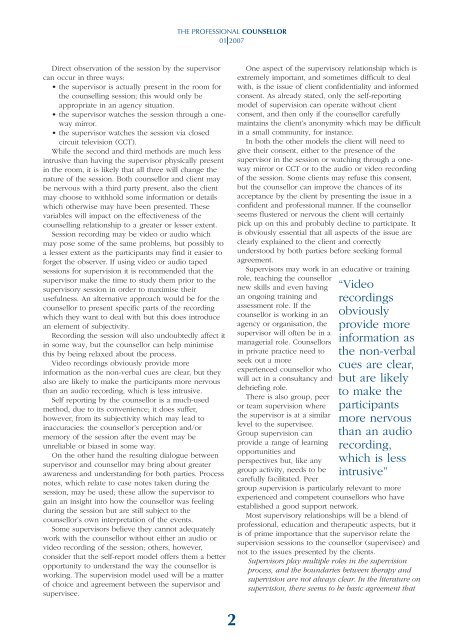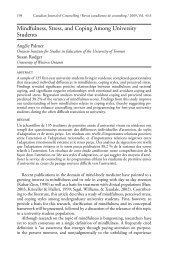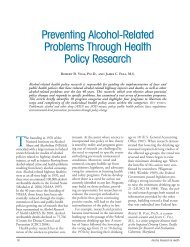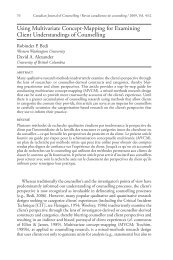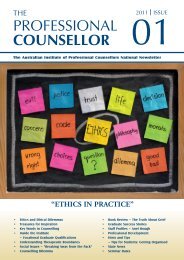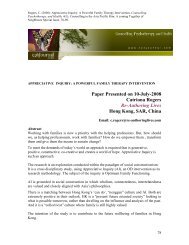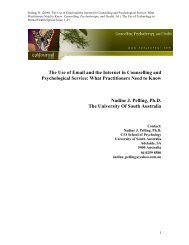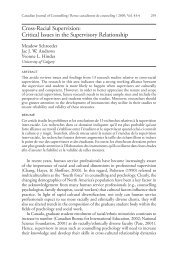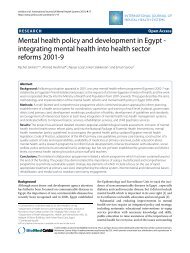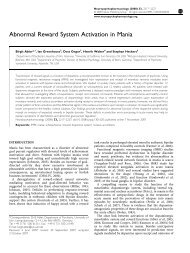PROFESSIONAL COUNSELLOR - Mental Health Academy
PROFESSIONAL COUNSELLOR - Mental Health Academy
PROFESSIONAL COUNSELLOR - Mental Health Academy
Create successful ePaper yourself
Turn your PDF publications into a flip-book with our unique Google optimized e-Paper software.
THE <strong>PROFESSIONAL</strong> <strong>COUNSELLOR</strong><br />
01 2007<br />
Direct observation of the session by the supervisor<br />
can occur in three ways:<br />
• the supervisor is actually present in the room for<br />
the counselling session; this would only be<br />
appropriate in an agency situation.<br />
• the supervisor watches the session through a oneway<br />
mirror.<br />
• the supervisor watches the session via closed<br />
circuit television (CCT).<br />
While the second and third methods are much less<br />
intrusive than having the supervisor physically present<br />
in the room, it is likely that all three will change the<br />
nature of the session. Both counsellor and client may<br />
be nervous with a third party present, also the client<br />
may choose to withhold some information or details<br />
which otherwise may have been presented. These<br />
variables will impact on the effectiveness of the<br />
counselling relationship to a greater or lesser extent.<br />
Session recording may be video or audio which<br />
may pose some of the same problems, but possibly to<br />
a lesser extent as the participants may find it easier to<br />
forget the observer. If using video or audio taped<br />
sessions for supervision it is recommended that the<br />
supervisor make the time to study them prior to the<br />
supervisory session in order to maximise their<br />
usefulness. An alternative approach would be for the<br />
counsellor to present specific parts of the recording<br />
which they want to deal with but this does introduce<br />
an element of subjectivity.<br />
Recording the session will also undoubtedly affect it<br />
in some way, but the counsellor can help minimise<br />
this by being relaxed about the process.<br />
Video recordings obviously provide more<br />
information as the non-verbal cues are clear, but they<br />
also are likely to make the participants more nervous<br />
than an audio recording, which is less intrusive.<br />
Self reporting by the counsellor is a much-used<br />
method, due to its convenience; it does suffer,<br />
however, from its subjectivity which may lead to<br />
inaccuracies: the counsellor’s perception and/or<br />
memory of the session after the event may be<br />
unreliable or biased in some way.<br />
On the other hand the resulting dialogue between<br />
supervisor and counsellor may bring about greater<br />
awareness and understanding for both parties. Process<br />
notes, which relate to case notes taken during the<br />
session, may be used; these allow the supervisor to<br />
gain an insight into how the counsellor was feeling<br />
during the session but are still subject to the<br />
counsellor’s own interpretation of the events.<br />
Some supervisors believe they cannot adequately<br />
work with the counsellor without either an audio or<br />
video recording of the session; others, however,<br />
consider that the self-report model offers them a better<br />
opportunity to understand the way the counsellor is<br />
working. The supervision model used will be a matter<br />
of choice and agreement between the supervisor and<br />
supervisee.<br />
One aspect of the supervisory relationship which is<br />
extremely important, and sometimes difficult to deal<br />
with, is the issue of client confidentiality and informed<br />
consent. As already stated, only the self-reporting<br />
model of supervision can operate without client<br />
consent, and then only if the counsellor carefully<br />
maintains the client’s anonymity which may be difficult<br />
in a small community, for instance.<br />
In both the other models the client will need to<br />
give their consent, either to the presence of the<br />
supervisor in the session or watching through a oneway<br />
mirror or CCT or to the audio or video recording<br />
of the session. Some clients may refuse this consent,<br />
but the counsellor can improve the chances of its<br />
acceptance by the client by presenting the issue in a<br />
confident and professional manner. If the counsellor<br />
seems flustered or nervous the client will certainly<br />
pick up on this and probably decline to participate. It<br />
is obviously essential that all aspects of the issue are<br />
clearly explained to the client and correctly<br />
understood by both parties before seeking formal<br />
agreement.<br />
Supervisors may work in an educative or training<br />
role, teaching the counsellor<br />
new skills and even having<br />
an ongoing training and<br />
assessment role. If the<br />
counsellor is working in an<br />
agency or organisation, the<br />
supervisor will often be in a<br />
managerial role. Counsellors<br />
in private practice need to<br />
seek out a more<br />
experienced counsellor who<br />
will act in a consultancy and<br />
debriefing role.<br />
There is also group, peer<br />
or team supervision where<br />
the supervisor is at a similar<br />
level to the supervisee.<br />
Group supervision can<br />
provide a range of learning<br />
opportunities and<br />
perspectives but, like any<br />
group activity, needs to be<br />
carefully facilitated. Peer<br />
“Video<br />
recordings<br />
obviously<br />
provide more<br />
information as<br />
the non-verbal<br />
cues are clear,<br />
but are likely<br />
to make the<br />
participants<br />
more nervous<br />
than an audio<br />
recording,<br />
which is less<br />
intrusive”<br />
group supervision is particularly relevant to more<br />
experienced and competent counsellors who have<br />
established a good support network.<br />
Most supervisory relationships will be a blend of<br />
professional, education and therapeutic aspects, but it<br />
is of prime importance that the supervisor relate the<br />
supervision sessions to the counsellor (supervisee) and<br />
not to the issues presented by the clients.<br />
Supervisors play multiple roles in the supervision<br />
process, and the boundaries between therapy and<br />
supervision are not always clear. In the literature on<br />
supervision, there seems to be basic agreement that<br />
2


